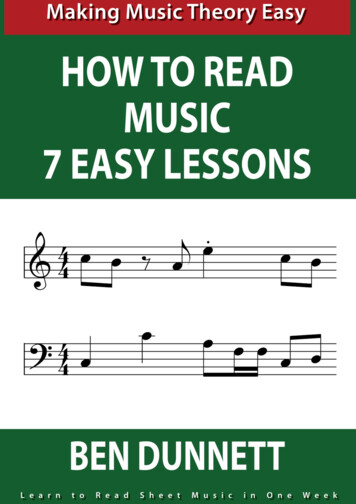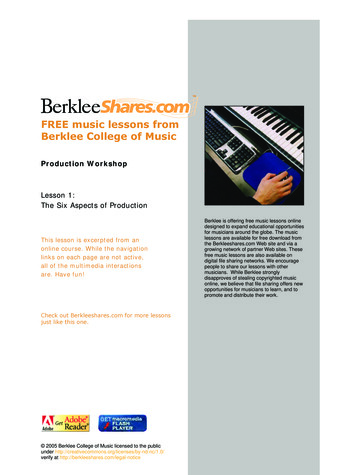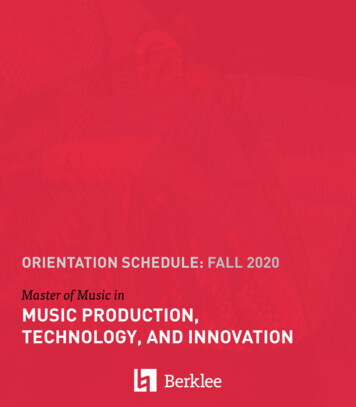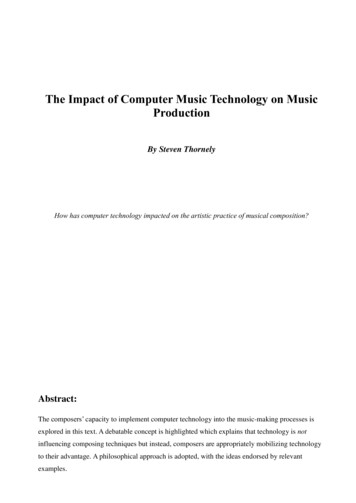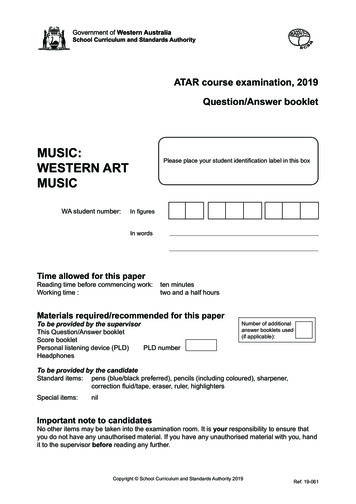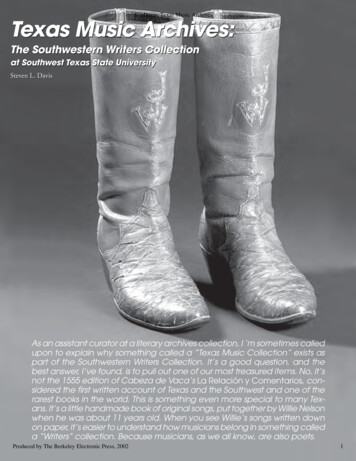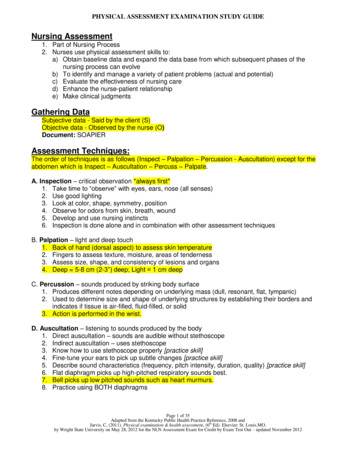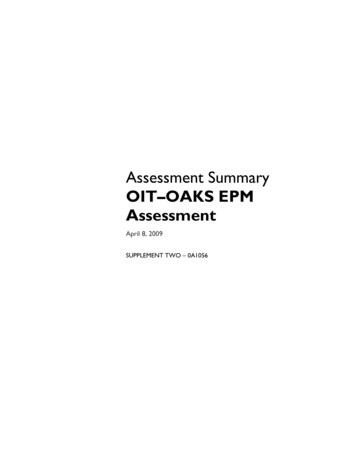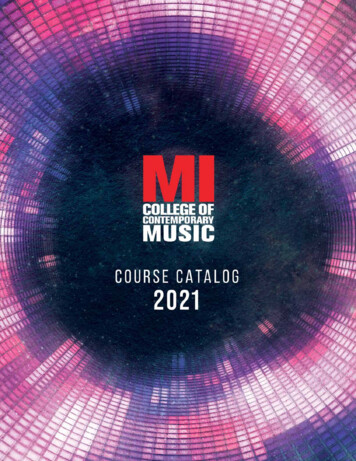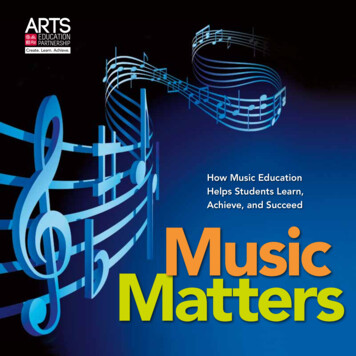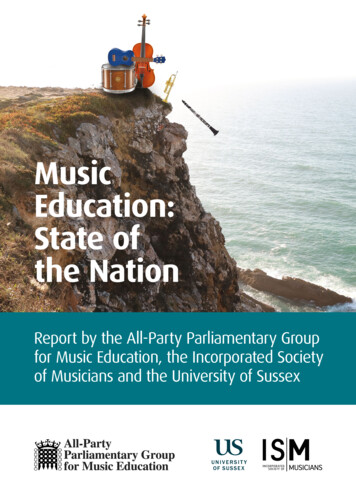
Transcription
ASSESSMENT IN MUSIC EDUCATION:THEORY, PRACTICE, AND POLICY20218The 8th International Symposium onAssessment in Music EducationMay 14-24, 2021The 8th International Symposium on Assessment in Music Education1
Table of ContentsWelcome.3Symposium Chairs.4-54-5Symposium Assistant. 6Sponsors.6Steering Committee.7Symposium Review Committee. 8Symposium Program.10-12Keynote Speakers.13-14Presenters. 15-482Assessment in Music Education: Theory, Practice, and Policy
WelcomeDear Colleagues,On behalf of the University of Florida, the Hochschule für Musik, Theater und Medien Hannover, and myco-chairs, Dr. Timothy S. Brophy and Dr. Andreas Lehmann-Wermser, I would like to welcome you tothe Eighth International Symposium on Assessment in Music Education. The ISAME events haveprovided opportunities for scholars from across the globe to share research, ideas, and best practices witheach other since 2007. Under the direction of Founding Chair Timothy S. Brophy, Director ofInstitutional Assessment at the University of Florida, these symposia have been held in Germany,England, Taiwan, and the United States. We are very pleased that you have chosen to join us for oureighth symposium, and the first to be held in a virtual format.Although we were not able to meet in person this year, we hope that you will still be able to enjoy manyof the same conversations and exchanges of ideas that you have at our previous symposia. We have awide range of sessions appealing to music educators at all levels, brought to you by leading scholarsworldwide and available to view on your own schedule. This benefit of our virtual format gives attendeesthe unprecedented opportunity to take in every single session at the symposium if they desire. Over the 10days of this symposium, you will have the opportunity to interact with colleagues in a variety of ways,asynchronous chat feeds, live question-and-answer sessions, and direct messages to other attendees. Weknow that the relationships that are developed at ISAME events are key to stimulating additional work inthis area of music education, and we encourage you to take advantage of these communication channelsto strengthen those relationships throughout this virtual conference.The past year has been unprecedented in many ways, and we have all felt the impacts of the COVID-19pandemic both personally and professionally. As rising vaccination rates begin to create hope for an endto this time of crisis, we continue to send to each of you our best wishes for health, safety, and success.Thank you again for your attendance at this symposium, and we look forward to sharing ideas with youover the next 10 days.Sincerely,Marshall HaningOrganizing Chair, ISAME8Assistant Professor of Choral Music EducationUniversity of FloridaTimothy S. BrophyFounding Chair, ISAMEDirector of Institutional Assessment and Professor of Music EducationUniversity of FloridaAndreas Lehmann-WermserCo-Chair, ISAME8Director of the Institute for Music Education Research and Professor of Music EducationHochschule für Musik, Theater und Medien HannoverThe 8th International Symposium on Assessment in Music Education3
Symposium ChairsTimothy S. Brophy, Founder Chair, ISAMEDirector of Institutional AssessmentProfessor of Music EducationUniversity of Florida, USATimothy S. Brophy is Director of Institutional Assessment at the University of Floridaand Professor of Music Education. Prior to his appointment as Director, he wasAssistant Dean for Research, Technology, and Administrative Affairs in the Collegeof the Arts and a member of the music education faculty in the School of Music.He joined the University of Florida faculty in 2000. He is a multiple award-winningteacher and an established researcher who possesses advanced knowledge andexpertise with organizational assessment systems and institutional, program, andacademic assessment. He has published numerous articles and book chapters,and is sole author of three books, including the widely acclaimed Assessing the Developing Child Musician. Hehas edited and published the selected papers from the 2007, 2009, 2011, 2013, 2015, and 2017 InternationalSymposia on Assessment in Music Education, and is sole editor and contributing author of the two-volumeOxford Handbook on Assessment Policy and Practice in Music Education. Dr. Brophy has conducted workshopsessions and conference presentations throughout the United States, and in Australia, Canada, China, England,Finland, Germany, Greece, Holland, New Zealand, Indonesia, Italy, Malaysia, Norway, Scotland, Spain, Sweden,and Taiwan.Dr. Brophy holds national and international leadership roles in assessment, served as a past National Chair ofthe Assessment Special Research Interest Group of The National Association for Music Education, and foundedthe first Assessment Special Interest Group for the International Society for Music Education. He has extensiveexperience with test development and data collection processes for standards-based assessments and knowslarge-scale assessment structures and processes, policy, and state and national assessment issues. He hastaught graduate courses in measurement and evaluation, and possesses working knowledge of psychometrics,classic test theory, and item response theory. He designed and implements the University of Florida’s AssessmentSystem and is active in the higher education assessment community as an author and presenter. Dr. Brophy hasfocused international attention on assessment in music education as the Founding and Organizing Chair of theInternational Symposia on Assessment in Music Education (ISAME), a biennial series of symposia that beganin 2007 and conducted around the world. He serves as an assessment expert for the New York State Arts BlueRibbon Commission. He worked with the International Baccalaureate in the Hague, Netherlands and Cardiff,Wales on the revision of the music assessments for the new IB music curriculum set to launch in 2020. Dr. Brophyis the SACSCOC liaison for the University of Florida and served on the SACSCOC Board of Trustees from 20112017. He holds a PhD in Music Education from the University of Kentucky, a Master of Music degree from theUniversity of Memphis, and a Bachelor of Music Education degree from the Cincinnati College-Conservatory ofMusic.4Assessment in Music Education: Theory, Practice, and Policy
Marshall Haning, Organizing ChairAssistant Professor of Music EducationUniversity of Florida, USAMarshall Haning is Assistant Professor of Music Education at the University of Florida,where he teaches undergraduate and graduate courses in choral music education,research methods, and other related topics. Before beginning his collegiate teachingcareer, Dr. Haning taught high school choir and music theory courses in the publicschools of North Carolina. He holds degrees from Case Western Reserve University,the University of Cincinnati’s College-Conservatory of Music, and Kent StateUniversity.Dr. Haning’s research interests include music education and music teacher educationcurricula, informal and nonformal approaches to music education, nonperformance music courses, andassessment in music education. He is well-published in scholarly journals including the Journal of Research inMusic Education, Journal of Music Teacher Education, International Journal of Music Education, Contributionsto Music Education, Visions of Research in Music Education, Update: Applications of Research in MusicEducation, and the Bulletin for the Council for Research in Music Education, and is a frequent presenter at state,national, and international music education conferences. Dr. Haning is also in demand as a choral clinician andadjudicator, and has served in this capacity across the United States as well as in Africa, Australia, and Europe.Andreas Lehmann-Wermser, Symposium Co-ChairHochschule für Musik, Theater und Medien(University of Music, Theatre, and Media)Hannover, GermanyAndreas Lehmann-Wermser. Born in 1955 he studied music education, Germanliterature and educational sciences and received his degree in teaching fromHannover Technical University. After 20 years of teaching in secondary schools hereturned to Hannover University of Music Drama and Media to receive a PhD inmusic education in 2002. From 2004 until 2015 Andreas Lehmann-Wermser actedas associate professor for music education at the University of Bremen but also asDirector of the Center for Teacher Education. In 2015 he was appointed full professorand director of the Institute for Music Education Research at Hannover University of Music Drama and Media.Andreas Lehmann-Wermser has conducted several large studies on musical competencies and musicalparticipation, mostly financed by the federal government of Germany. He is also founder and co-editor of theonline bulletin of empirical music education research and chair of ISME’s SIG on Assessment, Measurement andEvaluation.The 8th International Symposium on Assessment in Music Education5
Symposium AssistantJulia WeinsteinJulia Weinstein is currently a PhD student in Music Education at the University of Florida.She completed her Masters in Music Education degree with a GPA of 4.0 at the Universityof Florida and graduated Summa Cum Laude with a BS in Music Education from theUniversity of South Florida. Her research interests include the study of popular music inmusic education and she has presented her research at the 2021 Desert Skies Symposium.During her teaching career, Julia taught middle school band, elementary school generalmusic, private flute lessons, and worked as a marching band technician for various highschools throughout Florida. She has also worked as an instructor and director at artssummer camps.Sponsors6Assessment in Music Education: Theory, Practice, and Policy
Steering CommitteeLeo BorneFederal University of Mato Grosso, BrazilTimothy BrophyUniversity of Florida, USAFrederick BurrackKansas State University, USAMartin FautleyBirmingham City University, EnglandMarshall HaningUniversity of Florida, USAMichele HenryBaylor University, USAAndreas Lehmann-WermserHochschule für Musik, Theater und MedienDan MassothAmerican International School - KuwaitRose OmoloMaseno University, KenyaPhilip PayneKansas State University, USAJack WaltonThe University of Queensland, AustraliaDennis WangUniversity of Macau, ChinaJeffrey WardKansas State University, USAThe 8th International Symposium on Assessment in Music Education7
Symposium Review Committee8Regina Antunes dos SantosJosé Luis ArósteguiFederal University of Rio Grande do Sul, BrazilUniversity of Granada, SpainWilliam BauerLeonardo BorneFrederick BurrackFrancesca ChristmasUniversity of Florida, USAFederal University of Mato Grosso, BrazilKansas State University, USATrinity College, London, EnglandMing-Jen ChuangColleen ConwayNational Taichung University of Education, TaiwanUniversity of Michigan, USAWilliam DabbackLuciana Del-BenJames Madison University, USAFederal University of Rio Grande do Sul, BrazilNina DüvelHochschule für Musik, Theater und Medien Hannover, GermanyMartin FautleyBirmingham City University, EnglandSergio FigueiredoState University of Santa Catarina, UDESC, BrazilDavid GreennagelVirginia Commonwealth University, USAJoana GrowHochschule für Musik, Theater und Medien Hannover, GermanyRuth GurgelKansas State University, USADee HansenIndiana University, USABarry HartzUniversity of Florida, USAJason HawkinsWesterin Illinois University, USAValerie Krupp-SchleußnerUniversität Mainz, GermanyDon LeblerRicardo López LeónGriffith University, AustraliaPuerto Rico University, Puerto RicoSarah McQuarrieBridgewater State University, USADavid MillerUniversity of Florida, USAEric OtcherePhillip PayneGabriela PérezGhanaKansas State University, USANational Autonomous University of México, MexicoJennifer RowleyBrian RussellMegan SheridanUniversity of Sydney, AustraliaUniversity of Miami, USAUniversity of Florida, USARonald SherwinJeff WardUniversity of Massachusetts-Dartmouth, USAKansas State University, USAAssessment in Music Education: Theory, Practice, and Policy
The 8th International Symposium on Assessment in Music Education9
Symposium ProgramFriday, May 14, 20219:00amISAME8 Opening SessionMarshall Haning, Timothy S. Brophy,Andreas Lehmann-WermserSaturday, May 15, 20219:00 amWeb-Based Individual StudentAssessment in Instrumental MusicEducationAlden H. Snell, II; David A. StringhamSunday, May 16, 20219:00 amKeynote Address Q&A: MusicalJudgment as ArgumentativeCompetence, or: How to Argue Aboutthe Quality of MusicChristian RolleMonday, May 17, 20219:00 amA New Measurement Instrument forMusic-Related ArgumentativeCompetenceJulia Ehninger, Jens Knigge, Christian Rolle,Michael SchurigAssessing the Job InterviewPatty K. NelsonSchool and Community MusicPartnerships: Assessing for Learningand Stakeholder AccountabilityRonald SherwinThe Use of Daily Quizzes to Assess andIncrease Student Learning in MusicEducation CoursesDavid W. MontgomeryRedefining Assessment Literacy: MusicTeacher Education Curriculum in aPandemic LandscapeJared R. Rawlings, Kelly A. ParkesAcquisition of the Representation ofTonal Hierarchy in Pupils Aged 8-15: ASystematic Review and Meta-AnalysisHanna Mütze, Veronika Busch, Friedrich PlatzTuesday, May 18, 20219:00 am10Keynote Address Q&A: Policy asPractice: Reorienting Policy inProfessional Music EducationPatrick SchmidtAssessment in Music Education: Theory, Practice, and Policy
Wednesday, May 19, 20219:00 am Assessing Dispositions: StudentSelf-Perception vs FacultyPerception of Readiness for a Music TeacherPreparation ProgramBrazilian Music Assessment: A Scope ReviewMichael L. Alexander, Michele L. Henry,Kelly Jo Hollingsworth,David W. MontgomeryLeonardo BorneObservations from the Field: How thePandemic has Affected AssessmentEmily F. BarclayUniversity Music Program Assessment ofCOVID-19 Pandemic ResponsesJeffrey WardMeasuring Parental Involvement as ParentalActions in Children’s Private Music LessonsCancan CuiStudent Perceptions of Creating an Online,Multimedia Timeline to Support and AssessLearning Music HistoryWilliam I. Bauer, Dale E. BazanCombined Q&A: Music Grades:Ubiquitous, Consequential, and SomehowUnder the Radar AND ReimaginingRehearsals Through Formal FormativeAssessmentBrian ShawAn International Comparison of Teaching vs.Learning: Questioning Three FundamentalAssumptionsDaniel Johnson, Martin Fautley,Andreas Lehmann-WermserThursday, May 20, 20219:00 amCollaborative Working Session: Shared Language in AssessmentFriday, May 21, 20219:00 amA Framework for Building Assessment intothe Preservice Music Teacher CurriculumBenjamin C. HeltonAssessment in Instrumental MusicClassroomMário CardosoImplementation, Interaction, and edTPA: ACritical Case Study of Music TeacherEducationDavid PotterThe 8th International Symposium on Assessment in Music Education11
9:00 amMusic Formative Performance Assessmentsin a Pandemic Transformative Learning forEvery AgeAnnRené JosephProfessional Growth through Self and StudentAssessmentKaren Crocco, DMA, Deborah Girling,J. Lesleigh Howard-Zeno, Luke HallTrends in Policy-Making Affecting MusicEducation Assessment in the United StatesGlenn E. NiermanThe Effects of Feedback on Sight-singingAchievementAdam G. WhiteAssessment Design and ImplementationExperiences of Preservice Music EducatorsMegan M. SheridanReflections on Music Education Practices inEnglish Schools: An American Perspective onUnderlying PoliciesDaniel C. Johnson, Martin FautleySaturday, May 22, 20219:00 amLarge Ensemble Assessment: A NationalSurvey of Pre-Service Music Educators’PerspectivesAdam P. Miller, David A. StringhamMonday, May 24, 20219:00 am12ISAME8 Closing SessionMarshall Haning, Timothy S. Brophy,Andreas Lehmann-WermserAssessment in Music Education: Theory, Practice, and Policy
Keynote PresentersChristian RolleMusical Judgment as Argumentative Competence, or:How to Argue About theQuality of MusicLive Q&A: Sunday, May 16,9:00am ESTKeynote Abstract:Philosophical reflections onsome issues of assessment in the arts. In many casesthe assessment of musical learning and the evaluationof musical skills require the ability to judge. Musicaljudgment is needed to assess the quality of a musicalperformance. Sometimes assessment is based onfixed criteria including indicators describing how acriterion may be manifested, but even then, judgmentis required to appropriately apply the criteria on a caseby-case basis. Furthermore, we want our students todevelop good musical judgment because the ability ofself-assessment is a necessary precondition for theirfurther musical development. However, sometimesthere are no mutually agreed criteria for assessing thequality of a musical performance, sometimes peopledisagree about the value of a musical composition,sometimes musicians may have different opinionsabout how to perform a piece of music. This requiresargumentation. Admittedly, in many cases no wordsare needed because the participants reach anagreement through musical communication. It is aspecial characteristic of aesthetic argumentationthat it can take place largely non-verbally. The morethe participants are familiar with the music-culturalpractice they care about and the better they know eachother, the less they need words for their arguments.But sometimes talking helps. My suggestion is tounderstand musical judgment as the ability to provideconvincing arguments in the case of disagreementabout musical issues. We give reasons when we talkabout the performance after a concert or when wehave a dispute about different versions of musicalpieces performed by various artists. Students shouldlearn to argue about music with reason. Musicaljudgment can be considered a core competence ofmusic-as-practice. It is not about having good tastébut about critically reflective musicianship. Musicrelated argumentative competence can be understoodas the learnable ability to justify and defend aestheticjudgments about music in a comprehensive,plausible and differentiated way. Based on theoreticalconsiderations about music-related argumentationand its relevance for music education, I will present acompetence model which links argumentation theoryto aesthetics and the philosophy of art. This model ofmusic-related argumentative competence provides atheoretical framework describing how people justifytheir judgments about music. It also serves as a basisfor the development of an empirically validated testthat enables the assessment of studentś musicaljudgment.A New Measurement Instrument for Music-RelatedArgumentative CompetenceLive Q&A: Monday, May 17, 9:00am ESTAbstract 2: For abstract, see Julia EhningerBiography: Christian Rolle (PhD) is professor of musiceducation at the University of Cologne/Germany since2015. He heads the Institute for European Ethnomusicology. Previously, he was professor of music education at the University of Music Saarland and guestprofessor of musicology at the University of Örebro inSweden. Christian Rolle is member of the board of theWissenschaftliche Sozietät Musikpädagogik (https://wsmp.de) and editorial board member of the Zeitschriftfür Kritische Musikpädagogik (https://www.zfkm.org)and the journal Music Education Research. He studiedmusic education and philosophy and completed hisdoctorate at Hamburg University. His main researchinterests are aesthetics, philosophy of music education,mobile music making and education, and comparativeresearch on music education.Website: www.hf.uni-koeln.de/37245,Email: crolle@uni-koeln.deThe 8th International Symposium on Assessment in Music Education13
Patrick SchmidtPolicy as Practice:Reorienting Policy inProfessional MusicEducationLive Q&A: Tuesday, May18, 9:00am ESTAbstract: Whetheracknowledged or not, as a concept and practice policypermeates the deepest recesses of civil society and hasparticular impact on the lives of those who are activelyconnected to the educational process. Regardless ofsuch pervasiveness and of a growing literature on theabsence of local stake holder voice in educational policydiscussions, education and music teacher education,have only marginally engaged with policy, its practices,and its potential role in teacher voice and curricularchange.In this keynote I argue for a particular understanding ofpolicy practice at a human level, which is to say, policy asan integral, quotidian, near familial element of how weengage in the multiple aspects that shape educationalencounters. Policy practice, as argued here, places thepossibility of school culture change at the intersectionbetween teacher political empowerment—how we betterand more fully embed ourselves in the micropolitics ofschools—and teacher pedagogical empowerment—how we cope with the discomfort of regularly adaptingpractice (Schmidt, 2020). This presentation thenfocusses on the need to engage more fully with thenotion of policy, think the concept differently, whilelaying the groundwork for the need of a notion of policypractice as teacher practice.He also currently serves as a docent at the SibeliusAcademy, University of the Arts, Helsinki. Schmidt’sinnovative work in critical pedagogy, urban musiceducation and policy studies is recognized nationallyand internationally. His most recent publications can befound in the International Journal of Music Education;Theory into Practice; Arts Education Policy Review;Research in Music Education, Journal of CurriculumTheorizing; Philosophy of Music Education Review;Action, Criticism, and Theory for Music Education;ABEM Journal in Brazil; and the Finnish Journal of MusicEducation. Schmidt serves on the editorial boards of theJournal of the Council of Research in Music Education,Arts Education Policy Review, the ABEM Journal, theRevista Internacional de Educacíon Musical publishedby ISME, and the Journal of Popular Music Education.Beyond his ongoing research projects, Schmidt has ledseveral consulting and evaluative projects includingrecent work for the National YoungArts Foundation,and the New World Symphony in the United States,as well as for the Ministry of Culture and Educationin Chile. Schmidt co-edited the Oxford Handbook ofMusic Education and Social Justice released in 2015.His co-edited book Policy and the Political Life of MusicEducation was released by Oxford University Press inFebruary 2017. His latest book, Policy as Practice: Aguide for Music Educators was released by Oxford in2020.Biography: Patrick Schmidt is Professor of musiceducation at University of Western Ontario. Previouslyhe served as Associate Director of Florida InternationalUniversity’s School of Music in Miami, Florida and at theWestminster College in Princeton, USA, for 11 years.14Assessment in Music Education: Theory, Practice, and Policy
PresentersMichael L. AlexanderAssessing Dispositions: StudentSelf-Perception vs FacultyPerception of Readiness for a MusicTeacher Preparation ProgramLive Q&A: Wednesday, May 19th,9:00 am ESTAbstract: The purpose of this study was to focuson the assessment of personal dispositions inrelationship to students’ formal admission into musicteacher preparation programs. Over a period of fiveconsecutive semesters from Fall 2018 to Fall 2020, 81music education majors at a NASM-accredited Schoolof Music in the US underwent a Sophomore Evaluationprocess to determine admission into the musicteacher preparation program. At the conclusion of theprerequisite Introduction to Music Education course,each student completed a self-evaluation using theMusic Education Recommendation Form (MERF),which included personal dispositions for teachingsuitability. Each disposition required a 1-5 rating ona Likert-type scale. At the time of the SophomoreEvaluation, faculty members representing academic,applied, and ensemble areas completed the sameevaluation form (MERF) for each student. Differencesand similarities among faculty and student evaluationswere calculated for any effects of individualdispositions on program admission and/or completionrates. Results will be presented, and discussion willinclude implications for music educator preparationprograms.and conducting the Baylor Campus Orchestra. Inthe summer of 2021, he will assume the duties ofAssociate Dean for the Baylor School of Music.Dr. Alexander has served as President of the TexasOrchestra Directors Association, Vice-President of theTexas Music Educators Association, and President ofthe Texas Chapter of the American String TeachersAssociation (ASTA). He currently serves as ImmediatePast-Chair of the ASTA National Orchestra Festival.His work has been recognized with the HoustonSymphony Award for Excellence in Teaching, ASTAElizabeth A.H. Green Award, University of HoustonOutstanding Music Alumnus, TODA Orchestra Directorof the Year, and Baylor Outstanding Professor Award.Dr. Alexander has presented his research on stringsight-reading, tuning, and improvisation at state,national, and international symposia. He has coauthored Orchestra Expressions (Books 1 and 2),Expressive Techniques for Orchestra, and ExpressiveSight-Reading for Orchestra (Books 1 and 2). Hisresearch is published in the Journal of Research inMusic Education, UPDATE: Applications of Researchin Music Education, the String Research Journal,Texas Music Education Research, the American StringTeacher, the International Society of Assessment inMusic Education, and the Southwestern Musician.Alexander has served as clinician/conductor across theUnited States with several engagements in Europe.Biography: Dr. Michael Alexander serves as Professorof String Music Education at Baylor University. Hejoined the faculty in 2006 after 22 years of teachingorchestra at Stratford HS in Houston, Texas. He holdsdegrees from Southwestern University (BME), SamHouston State University (MM), and the Universityof Houston (DMA). His duties at Baylor includesupervising student teachers, instruction in classroomstring pedagogy, directing the Baylor String Project,The 8th International Symposium on Assessment in Music Education15
Myriam I. Athanas FaulknerEmily F. BarclayObservations fromthe Field: How thePandemic hasAffected AssessmentExamining Self-AssessmentAccuracy of Pre-Service MusicEducators’ Verbal FeedbackEffectivenessAbstract: The purpose of thisstudy was to examine the selfassessment accuracy of preservice music educators’ verbalfeedback effectiveness in thecontext of secondary-level instrumental ensembleinstruction. The research questions that guided thisstudy include: (a) Overall, how accurate were pre-servicemusic educators’ perceptions of their verbal feedbackwhen compared to content experts’ perceptions? (b)How does accuracy vary across each item of the scale?and (c) How does accuracy vary across each domainof the scale? Using a 35-item rating scale embeddedwithin five instructional domains, the accuracy betweencontent experts’ evaluation of students and students’evaluation of themselves for the same teaching episodewere examined at both item- and domain- levels.Considerations for the inclusion of self-assessmentaccuracy measures in teacher preparation curricula andits role in improving student-teacher communication,instructional effectiveness, differentiated instruction,and reflective practice will be discussed.Assessing Students’ Self-Talk, Resilience, and SocialEnvironment in the Context of the Secondary-LevelInstrumental Music ClassroomAbstract 2: For abstract, see Molly BlairBiography: Myriam Athanas is a Ph.D. Candidate in theHugh Hodgson School of Music.Live Q&A:Wednesday, May19th, 9:00 am ESTAbstract: The impact of the global COVID-19 pandemichas been felt by all citizens of the world, but perhapsmost strongly by teachers, students, and parents.Our educational landscape has shifted dramatically,seemingly overnight, as teachers began teaching,guiding, and assessing in a digital landscape.“Observations from the Field: How the Pandemichas Affected Assessment” will include first-handaccounts from teachers in a multitude of settings-in-person learning, hybrid models, and distancelearning, focusing on how assessment has occurred inthe past 12-14 months. This presentation will includeboth pre-recorded video interviews with educators,as well as a question and answer session. The primarysources being shared are American and focus on theexperience within the United States.The presentation will highlight the creative andresilient ways teachers are determining the growth andneeds of their students in the middle of the pandemic,focusing on programs, strategies, and systems beingutilized to assess student knowledge in the newnormal. These experiences
Hannover Technical University. After 20 years of teaching in secondary schools he returned to Hannover University of Music Drama and Media to receive a PhD in music education in 2002. From 2004 until 2015 Andreas Lehmann-Wermser acted as associate professor for music
